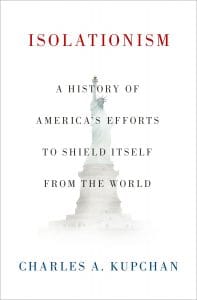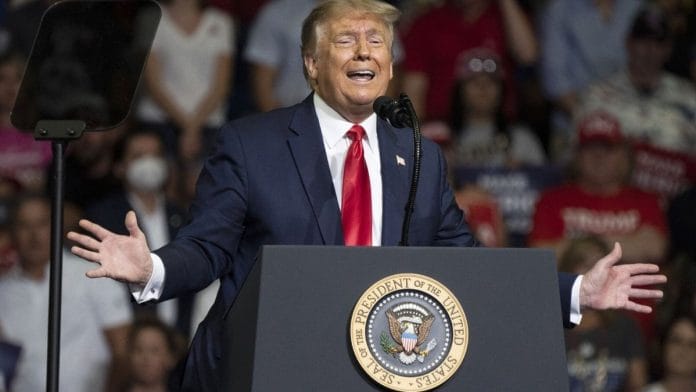The United States is in the midst of a bruising debate about its role in the world. Not since the interwar era have Americans been so divided over the scope and nature of their engagement abroad. President Donald Trump’s America First approach to foreign policy certainly amplified the controversy. His isolationist, unilateralist, protectionist, and anti-immigrant proclivities marked a sharp break with the brand of internationalism that the country had embraced since World War II. But Trump’s election was a symptom as much as a cause of the nation’s rethink of its approach to the world. Decades of war in the Middle East with little to show for it, rising inequality and the hollowing out of the nation’s manufacturing sector, political paralysis over how to fix a dysfunctional immigration policy—these and other trends have been causing Americans to ask legitimate questions about whether U.S. grand strategy has been working to their benefit.
The COVID-19 pandemic then caused a severe economic downturn the likes of which the nation had not experienced since the 1930s—the last time the United States made the mistake of beating a strategic retreat in the face of mounting trouble abroad. Adding to the urgent and heated nature of this rethink of American foreign policy is China’s rise and the threat it poses to the liberal international order that took shape during the era of the West’s material and ideological dominance.
Isolationism speaks directly to this unfolding debate over the future of the nation’s engagement with the world. It does so primarily by looking back, by probing America’s isolationist past. Although most Americans know little about it, the United States in fact has an impressive isolationist pedigree. In his Farewell Address of 1796, President George Washington set the young nation on a clear course: “It is our true policy to steer clear of permanent alliances with any portion of the foreign world.” The isolationist impulse embraced by Washington and the other Founders guided the nation for much of its history prior to the Japanese attack on Pearl Harbor in 1941.
Also read: Trump will leave White House but America’s age of anger is just getting started
My starting premise is not that the United States should or will return to the grand strategy of nonentanglement urged on the nation by its first president. But America’s isolationist past does have much to teach us about the nation’s current geopolitical predicament. Many readers may find this assertion puzzling. After all, the United States has spent much of the last eighty years strenuously trying to run the world through a global network of international institutions, alliances, and military bases. Beginning during World War II and continuing well into the twenty-first century, successive administrations have sought to open up and knit together international markets while maintaining strategic commitments in virtually all quarters of the globe.
America’s sustained enthusiasm for international engagement is, however, the exception, not the rule, across the nation’s history. Prior to the country’s entry into World War II, Americans were generally averse to foreign entanglement, shunned alliances and other binding pacts, backed tariffs to protect the domestic economy, and embraced successive waves of anti-immigrant sentiment. In short, Trump’s America First grand strategy was in many respects a throwback to an earlier era. He explicitly linked his approach to the world to the America First Committee, the group of diehard isolationists that formed in 1940 to block the nation’s entry into World War II. Trump’s foreign policy was not some bolt from the blue. On the contrary, the notion of America First has deep roots in the nation’s history and identity—precisely why mining the nation’s past can shed considerable light on the present and future.
Trump’s embrace of America First was hardly the only reason I felt compelled to study the nation’s isolationist past. Indeed, I started this book in 2012, well before Trump came into office. A number of considerations led me to embark on a project aimed at telling the story of isolationism across the full arc of American history.
Multiple warning signs suggested that the fall of the Berlin Wall and the end of the Cold War made fragile the activist brand of internationalism that Americans had embraced during the second half of the twentieth century. After Iraq invaded Kuwait in 1990, the Senate in 1991 approved by only a close margin—52 to 47—President George H. W. Bush’s war to expel Iraqi forces. President Bill Clinton then dragged his feet when it came to using the U.S. military to put a stop to the bloodshed that afflicted the Balkans during the 1990s. Especially after the Republican takeover of Congress in 1994, the bipartisan compact of centrist Democrats and Republicans that had long supported a robust and steady brand of U.S. engagement abroad began to unravel. Politics no longer stopped at the water’s edge. All the while, coverage of foreign affairs in the print and broadcast media fell off precipitously. Americans were losing interest in the rest of the world.
Also read: Donald Trump’s Republican vision is America First, America Most and America Darkest
The terror attacks of September 11, 2001, abruptly halted the nation’s inward turn. The wars in Afghanistan and Iraq initially galvanized the nation and helped restore a bipartisan consensus on the conduct of statecraft. But political polarization only intensified as those wars dragged on, prompting many Americans to ask why their tax dollars were going toward the construction of schools in Afghanistan rather than in Alabama. Conversations with family, friends, and fellow Americans I would meet in the course of travels around the country revealed growing discontent with the nation’s embroilment in the Middle East. It was no surprise that President Barack Obama was keen to get the United States out of its ongoing wars in Afghanistan and Iraq. As he campaigned for reelection, one of his common refrains was “now is the time to focus on nation-building here at home.” Obama clearly sensed that the public was tiring of foreign entanglement. In the end, the post–September 11 wars ended up reinforcing, not arresting, the nation’s inward turn.
 From ISOLATIONISM: A History of America’s Efforts to Shield Itself from the World by Charles A. Kupchan. Copyright © 2020 by Charles A. Kupchan and published by Oxford University Press. All rights reserved.
From ISOLATIONISM: A History of America’s Efforts to Shield Itself from the World by Charles A. Kupchan. Copyright © 2020 by Charles A. Kupchan and published by Oxford University Press. All rights reserved.






